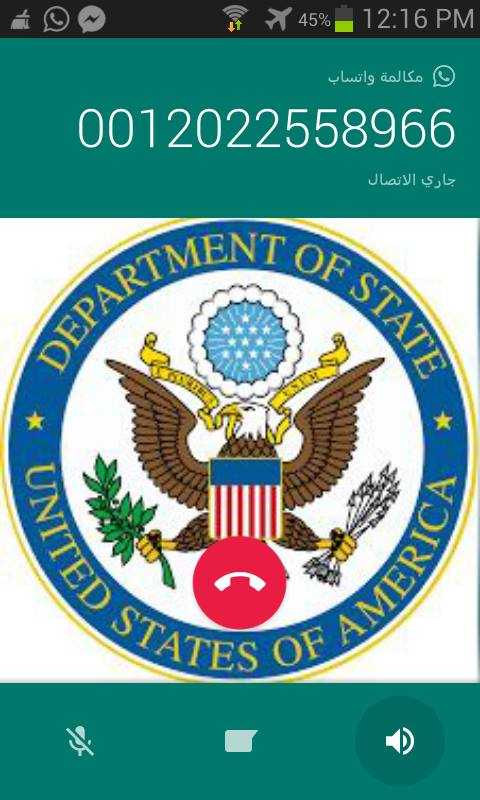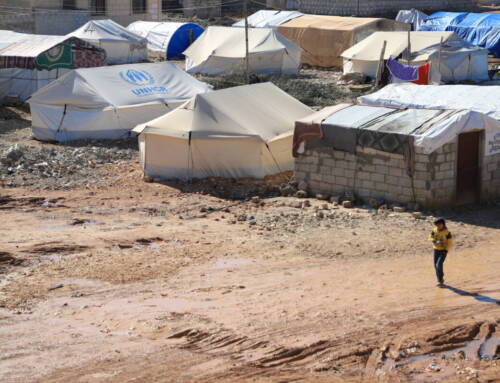On the line with the State Department ceasefire hotline: ‘America has no idea what’s happening on the ground in Syria’
AMMAN: On Saturday, the same day that the ceasefire went […]
2 March 2016
AMMAN: On Saturday, the same day that the ceasefire went into effect in Syria, the US State Department established a hotline to record reported breaches of it.
Late Saturday night, Syria Direct reporter Osama Abu Zeid posted the following news item on his personal Facebook page: “Calm after [ceasefire] violations, with mortar shells fired on Aleppo, Homs, Telbisa, Latakia, Hama and Daraa.”
Fellow reporter Ammar Hamou replied on Facebook that the Americans had set up a hotline to report ceasefire breaches, but he did not have enough phone credit to call Washington DC. Reporter Orion Wilcox offered to call in and report it.
“I called at 12:45am Saturday morning, just 45 minutes into the ceasefire,” says Syria Direct reporter Wilcox.
“I didn’t expect an American to answer; he answered in English but switched to Arabic. I started telling him in Arabic about reports we were getting from Homs province of specific ceasefire violations.”
The person monitoring the hotline only asked where the incidents were happening.
“He’s really struggling and can’t understand me,” says Wilcox. “I’m like, why is this American guy on the phone who can’t speak Arabic? I’d give a detailed account of something happening in Homs province and he would listen and his answer was: ‘Homs.’ That’s it.”

Wilcox says he finally switched to English and asked the hotline monitor how he could effectively document events without understanding all the Arabic. The operator answered that other people were working the hotline, declined to comment further and hung up.
In an online statement Monday, US Special Envoy to Syria Michael Ratney said the CoH Coordination Team in Washington DC takes reports of violations “very seriously and follows up on each one,” adding that the “greater the specificity of these reports, the more useful they are for monitoring and follow up.”
Syria Direct interviewed activists on the ground who have attempted to file reports with the ceasefire hotline. Given the communication difficulties, at least one activist says he has given up on reporting alleged breaches to the State Department hotline.
“We attempted to call the [Department of State’s hotline], but we don’t think they understood what we were saying,” said Abu Odei al-Homsi, an activist with the Ceasefire Monitoring Center in the Homs countyside.
“Now we are calling the United Nations and the High Negotiations Coordinating Committee,” said al-Homsi, adding that the UN hotline is operated by a native Arabic speaker.
“We are mindful and working to address the difficulties that some have experienced when calling in to convey reports of violations in Arabic,” a State Department official told Syria Direct on Wednesday, adding that “we continue to develop and improve mechanisms to monitor the cessation of hostilities.”
The State Department on Tuesday called on “all parties” to continue reporting alleged violations.
Success “really does depend on all parties to report what they know, where they see it, and what they’re experiencing,” said State Department spokesman John Kirby.
“Over the last 24 hours [the State Department has] not been apprised of any claims of any additional violations of any significance.”
Syrians such as Salim a-Rihal from north Homs—an area that witnessed intense fighting and shelling on Tuesday—say that such statements point to a total lack of understanding in Washington.
“These statements show that America has no idea what’s happening on the ground in Syria,” said a-Rihal.
Ceasefire violations in the land of Pepsi
On Monday, Syria Direct’s Osama Abu Zeid called the hotline number advertised by the State Department’s Twitter account (1-202-736-7829) to report a series of Russian airstrikes on villages in southern Hama province earlier in the day.
The first State Department employee to answer the phone told Osama, in stilted Arabic, that he had the “wrong number” before disconnecting the line.
Osama redialed the same number, and another employee answered the call.
“Ok sir, I’m a Syrian journalist and I’d like to report a breach of the hudna [ceasefire] involving multiple airstrikes in the countryside south of Hama city—at the area where Hama governorate meets northern Homs province,” Osama said. [For additional reporting on this reported ceasefire violation, the Hama News Agency’s coverage is here.]
During the four-minute phone call, the operator struggled to ask basic questions regarding the incident.
At one point, when attempting to ask Osama if the strikes had resulted in any casualties, the operator instead said what appeared to be an accidental string of expletives.
Osama explained that local residents believed that Russian planes were responsible for the airstrikes based on the “intensity of the strikes” and the “number of planes” participating. Following this detailed explanation, the operator replied: “Russian.”
During the call Osama told the operator the name of the village (Hirbinifsah) four times and spelled it out.
However, when Osama asked whether the operator knew where the village was, he responded: “Yes, Harb Bebsi,” the latter being the word for “Pepsi” in Arabic.
Syria Direct reporter Osama Abu Zeid called the Cessation of Hostilities Coordination Team on February 29, 2016 at 6pm Damascus time. Here’s what happened:
Operator: Hello? [English].
Osama: Marhaba [Arabic].
Operator: Salamu Alaikum.
Osama: Wa Alaikum a-Salam. How are you? [Henceforth, speaking Arabic only.]
Operator: We are the Hudna Monitoring Center at the State Department.
Osama: “Ok sir, I’m a Syrian journalist and I’d like to report a breach of the hudna [ceasefire] involving multiple airstrikes in the countryside south of Hama city—at the area where Hama governorate meets northern Homs province.”
Operator: “So…in Hama?”
Osama: “Yes, in the southern Hama countryside.”
Operator: “In today?”
Osama: “Yes, today.”
Operator: “Today at what time?”
Osama: “Ok, so I’ve recorded multiple times. The first strike occurred at 8:30am…Damascus time.”
Operator: “8:30…in the morning?”
Osama: “Exactly, Damascus time. The strikes continued until approximately 9:00am and in total there were 10 strikes [during that period]. I’m talking about the number of strikes not the number of planes.”
Operator: “And they were all from planes?”
Osama: “Exactly, airstrikes. And the airstrikes started back up again about a half an hour later and from that point there were two airstrikes every half hour.”
Operator: “Mmhmm.”
Osama: “Now the area I’m referring to is called Harbnifsah.”
Operator: “Harb…”
Osama: “Nifsah.”
Operator: “Nibsat with a B?”
Osama: “Nifsah with an F.”
Operator: “Ok…Nibsah.”
Osama: “Ok, so there were airstrikes every half hour with the last strike recorded around 3:25pm Damascus time. In the afternoon.”
Operator: “In the afternoon.”
Osama: “That was the last recorded strike. Now there was also ground fighting. Following the airstrikes there was an attempt by infantry troops to advance.”
Operator: “Ok…”
Osama: “And there was an operation conducted by the opposition to stop this advance.”
Operator: “So all the…excuse me…the attack is against the opposition or…against civilians.”
Osama: “Ok, so there were airstrikes on civilian villages and at the same time there was an attack on opposition fighters in the same area.”
Operator: “Ah, so both…”
Osama: “Yes, they launched airstrikes at the same time—air cover—and then there was an attempt to launch a ground attack. And the opposition repelled the attack.”
Operator: “Ok…Ok umm are there…[unclear]…is there the dead guy?”
Osama: “Casualties?”
Operator: “Yes.”
Osama: “So there are casualties. According to the information we have received there are three civilian casualties—as a result of the airstrikes. With regard to the opposition fighters, I don’t know.”
Operator: “Ok, and the civilians. Do you know how many?”
Osama: “Three.”
Operator: “Three.”
Osama: “Exactly.”
Operator: “Ok.”
Operator: “And this is the regime or… another party?”
Osama: “So it’s difficult for civilians to recognize [the responsible party] based on the type of plane but they do have experience [determining the party] based on the intensity of the strikes. When the strikes are intense, it is usually Russian planes that are responsible—meaning when there are multiple planes participating and multiple airstrikes, it is usually Russian war planes.”
Operator: “Russian.”
Osama: “Exactly, that’s how they determine [who is carrying out the strikes]. So based on the intensity of the strikes from 7:30-9:00am, they believe Russian planes were responsible.”
Operator: “Ok.”
Osama: “And from 12:00pm—meaning mid-day—until 12:15pm there were also intense airstrikes and they also think they were Russian.”
Operator: “So how do you know the planes were Russian…or…the…regime?”
Osama: “So like I said, they believe the strikes during that period were Russian because of the intensity of the strikes. The Russians are able to operate multiple planes at one time and conduct multiple strikes.”
Operator: “Ok.”
Osama: “It’s an informed judgment. They don’t know exactly.”
Operator: “Ok, good. Thank you very much.”
Osama: “Ok, so you did you get it all sir? You know the area I’m talking about?”
Operator: “Mmhmm…”
Osama: “It’s in south Hama. The name of the village is Harbnifsah.”
Operator: “Yes, yes, yes.”
Osama: “Ok, so you got it?”
Operator: “Harb Bebsi.” [Bebsi is the Arabic word for “Pepsi.”]







